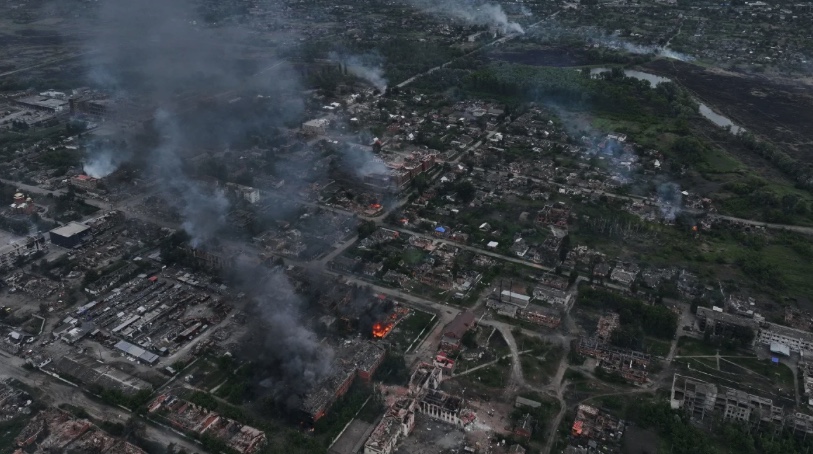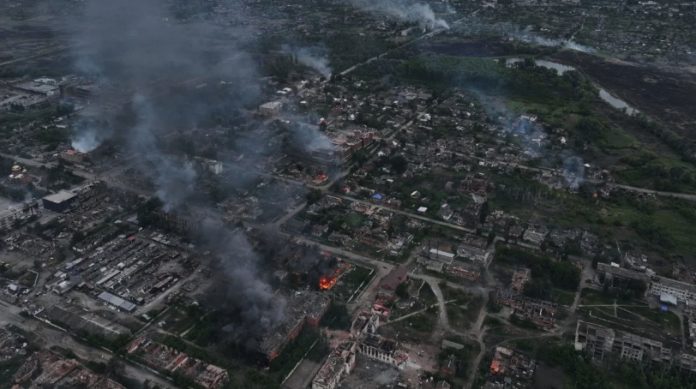กองกำลังรัสเซียได้จับกุมพลเรือนหลายสิบคนในเมืองวอฟชานสค์ ซึ่งเป็นเมืองชายแดน ตามรายงานของเจ้าหน้าที่ยูเครน โดยเจ้าหน้าที่ตำรวจระดับสูงในภูมิภาคกล่าวหาว่าพวกเขาใช้เชลยศึกเป็น “โล่มนุษย์” มอสโกได้เพิ่มความเข้มข้นในการรุกในทางตอนเหนือของยูเครน โดยเปิดปฏิบัติการที่น่าประหลาดใจที่สุดในรอบสองปีของสงครามเมื่อสัปดาห์ที่แล้ว โดยข้ามพรมแดนทางตอนเหนือเพื่อพยายามยึดคาร์คิฟ เมืองที่มีประชากรมากเป็นอันดับสองของประเทศ วอฟชานสค์ ซึ่งตั้งอยู่ทางตอนเหนือของคาร์คิฟ ถูกโจมตีอย่างหนัก โดยกองกำลังรัสเซียอ้างสิทธิ์ในการควบคุมหมู่บ้านโดยรอบ และบังคับให้พลเรือนต้องหลบหนี
การโจมตีข้ามพรมแดนเกิดขึ้นในช่วงเดือนที่ท้าทายสำหรับเคียฟ และเน้นย้ำถึงความยากลำบากที่ชาวยูเครนต้องเผชิญในปีนี้ กองกำลังของพวกเขามีกำลังน้อย โดยมีปืนใหญ่น้อยกว่ารัสเซียอย่างมาก การป้องกันทางอากาศไม่เพียงพอ และการขาดแคลนทหาร สภาพอากาศที่แห้งแล้งทำให้สถานการณ์เลวร้ายลง ส่งผลให้หน่วยยานยนต์ของรัสเซียสามารถเคลื่อนที่ได้ง่ายขึ้น นักวิเคราะห์หลายคนคาดการณ์ว่ารัสเซียจะขยายการโจมตีชายแดนไปทางตะวันตกไปยังภูมิภาคซูมี ซึ่งต้องทนรับการโจมตีโดยกองกำลังพิเศษของรัสเซียมาหลายเดือน รัสเซียมีกำลังคนอย่างมีประสิทธิภาพในการขยายแนวป้องกันของยูเครนผ่านจุดโจมตีต่างๆ ที่ห่างกันหลายร้อยกิโลเมตร ทำให้เคียฟต้องเดาว่าการรุกช่วงต้นฤดูร้อนที่คาดการณ์ไว้จะรวมศูนย์ไว้ที่ใดและเมื่อใด
เซอร์ฮี โบลวินอฟ หัวหน้าแผนกสืบสวนของตำรวจภูมิภาคคาร์คิฟ บอกกับซัสปิลเนนิวส์ว่า ทหารรัสเซียได้ควบคุมตัวพลเรือนประมาณ 40 คนใกล้กับ “กองบัญชาการ” ของพวกเขา บุคคลเหล่านี้ ซึ่งส่วนใหญ่เป็นผู้สูงอายุ กำลังถูกสอบปากคำโดยบุคคลที่อ้างว่าเป็นพนักงาน FSB และถูกใช้เป็น “เกราะป้องกันมนุษย์” โบลวินอฟกล่าวว่าผู้สูงอายุคนหนึ่งในเมืองวอฟชานสค์ถูกทหารรัสเซียสังหารขณะพยายามหลบหนี สัปดาห์ที่แล้ว ประธานาธิบดียูเครน โวโลดีมีร์ เซเลนสกี เลื่อนการเยือนระหว่างประเทศเนื่องจากการรุกอย่างต่อเนื่อง ในการให้สัมภาษณ์กับ AFP เขาระบุว่าแม้ว่ากองกำลังยูเครนจะควบคุมเส้นทางเข้าของกองทหารรัสเซียในภูมิภาคคาร์คิฟ แต่สถานการณ์ยังคงมีความผันผวน
Ukrainian officials report that Russian forces are using captives from border towns as ‘human shields’

Russian forces have captured dozens of civilians in the border town of Vovchansk, a Ukrainian official reported, with a top regional police officer accusing them of using the captives as “human shields.” Moscow has intensified its offensive in northern Ukraine, launching its most surprising operation in two years of war last week, crossing the northern border in renewed attempts to capture Kharkiv, the country’s second most populous city. Vovchansk, located in the northern Kharkiv region, has been under heavy attack, with Russian forces claiming control of surrounding villages, forcing civilians to flee.
The cross-border attack came during a challenging month for Kyiv and highlighted the ongoing difficulties faced by the Ukrainians this year. Their forces are stretched thin, with significantly less artillery than the Russians, inadequate air defences, and a shortage of soldiers. Dry weather has exacerbated their situation, allowing Russian mechanized units to maneuver more easily. Several analysts predict that the Russians will expand their border attacks westwards to the Sumy region, which has endured months of raids by Russian special forces. The Russians effectively have the manpower to stretch Ukrainian defences across multiple attack points hundreds of kilometres apart, forcing Kyiv to guess where and when an anticipated early-summer offensive will be concentrated.
Serhii Bolvinov, head of the investigative department of Kharkiv regional police, told Suspilne News that Russian soldiers detained around 40 civilians near their “command headquarters.” These individuals, mostly elderly, are being interrogated by individuals claiming to be FSB employees and used as “human shields.” Bolvinov mentioned that one elderly resident of Vovchansk was killed by Russian soldiers when trying to escape. Last week, Ukraine President Volodymyr Zelensky postponed international visits due to the ongoing offensive. In an AFP interview, he stated that while Ukrainian forces control entry routes for Russian troops in the Kharkiv region, the situation remains volatile.
By CNN NEWS

















